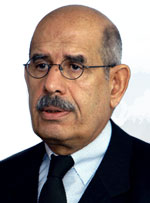- Iranian ambassador sets the record straight (FCN, 04-07-2007)
- Nuclear hypocrisy in Iran’s treatment (FCN, 03-12-2006)

UNITED NATIONS (FinalCall.com) – Mohammed El-Baradei, Director General of the International Atomic Energy Agency (IAEA), during the opening day of the 51st annual regular session of the IAEA General Conference in Vienna Sept. 17, warned against the “hasty use of force over Iran’s nuclear program,” in response to recent statements made by France’s foreign minister, Bernard Kouchner.
According to Al Jazeera (Qatar), Mr. Kouchner stated during interviews on French television and radio in reference to Iran’s continued work on its nuclear program: “We have to prepare for the worst, and the worst in war.”
“We need always to remember that use of force could only be resorted to when every option has been exhausted. There is a UN charter and there are rules for the international use of force,” Mr. El-Baradei, stated.
In response to Mr. El-Baradei’s statement, an editorial in the Iranian daily newspaper Hezbollah said, “With this attitude of El-Baradei there is hope of finding a peaceful solution to the crisis,” adding that Mr. El-Baradei “has proved that far from the propaganda of the U.S., UK and their new ally, France, the IAEA will reclaim its credibility and honor.”
Just days after the statements by the French foreign minister, other editorials struck a more dismal view of his war rhetoric. On Sept. 18, an editorial in the Jordan Times stated that, “Beating the drums of war is easy, but hasn’t the West learned yet that hasty decisions unnecessarily waste lives and resources,” while Arab News (Saudi Arabia)stated, “If Kouchner says war is a possibility, we have to take that warning seriously.”
On Sept. 19, the U.S. joined the war of words, as reported by The Associated Press, when during her visit to Ireland, Secretary of State Condoleezza Rice said, “The IAEA is not in the business of diplomacy, suggesting that the IAEA’s board and director are freelancing where they do not belong.”
The AP story also reported that Secy. Rice said “the United States and its partners will move forward with a request for a third round of Security Council sanctions.”
Around the world, media publications have been feverishly reporting on the “war with Iran” issue. According to United Kingdom’s The Times newspaper, the U.S. is trying to “regain the upper hand,” and was scheduled to meet with the political directors of the five permanent members of the Security Council (Britain, Russia, France and China) plus Germany in Washington, D.C. on Sept. 21, however, the Security Council is not expected to take up the issue until October, say UN officials.
“In recent weeks there have been signs that the diplomatic pressure on Tehran is weakening; and Moscow’s position seems less certain,” BBC News reported on Sept. 20. On Sept. 14, Reuters reported that a “split has emerged in the coalition of Western powers pressuring Iran to freeze its nuclear enrichment program, as France backs the U.S. calls for a new round of sanctions while Germany urges restraint.”
Sueddeutsche Zeitung out of Germany reported, “Germany is hesitant when it comes to sanctions, and Russia and China must realize that a new storm is brewing.”
The Italian Foreign Minister Massimo D’Alema, in a comment to Corriere della Sera (Milan), was quoted as saying: “New wars would only create new tragedies and dangers,” noting that the “UN has been seized of the matter, that there are in place sanctions that have been decided by the international community and that there is, at the same time, a proposal to Iran to negotiate peacefully a way out of the crisis.”
A commentator in Amman, Jordan’s daily al-Rai: “Iran’s nuclear installations pose a threat to the nearby Gulf states. So much is true. Therefore, and by the same token, it is necessary to pay attention to the threat by Israel’s nuclear sites for the countries near the Hebrew state. This is not to change the subject. It is at the heart of the matter.”
An editorial in the Plain Dealer (Cleveland, Ohio) on Sept. 19, stressed that, “Talk of impending war with Iran is counterproductive. It does nothing to advance Western interests in curbing Iran’s appetite for nuclear weapons. U.S. Defense Secretary Robert Gates correctly emphasizes that diplomacy and sanctions are by far the preferable approach.”
The U.S. think tank Council on Foreign Relations’s (CFR) Backgrounder reported that intelligence on Iran is still lacking. “In recent months, some U.S. analysts and policymakers have raised doubts about the quality and credibility of American intelligence on Iran. With few actual spies on the ground in Iran and no consular presence in Tehran, not to mention the United States’ limited intelligence gleamed from satellite imagery and data, some question the reliability of evidence regarding Iran’s uranium enrichment program.”
UN Secretary-General Ban Ki-Moon, when asked by a CNN reporter if he believed there would be war with Iran, said, “As a matter of principle, all pending issues, whatever the reasons may be, would be better resolved through peaceful means, through dialogue,” while The Mideast Mirror (UK) observed on Sept. 18: “The Iranian interior surprises one with its calm approach to what is happening around it, so much so that one begins to believe that the intended target is another country altogether.”












